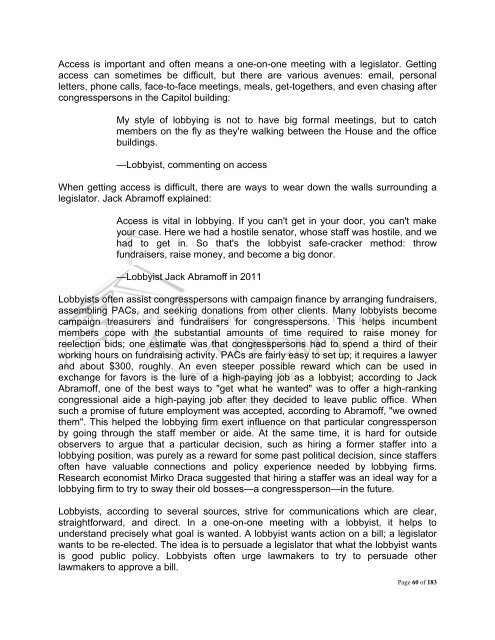The 508(c)(1)(a) Initiative Workshop
The 508(c)(1)(a) Initiative Workshop
The 508(c)(1)(a) Initiative Workshop
You also want an ePaper? Increase the reach of your titles
YUMPU automatically turns print PDFs into web optimized ePapers that Google loves.
Access is important and often means a one-on-one meeting with a legislator. Getting<br />
access can sometimes be difficult, but there are various avenues: email, personal<br />
letters, phone calls, face-to-face meetings, meals, get-togethers, and even chasing after<br />
congresspersons in the Capitol building:<br />
My style of lobbying is not to have big formal meetings, but to catch<br />
members on the fly as they're walking between the House and the office<br />
buildings.<br />
—Lobbyist, commenting on access<br />
When getting access is difficult, there are ways to wear down the walls surrounding a<br />
legislator. Jack Abramoff explained:<br />
Access is vital in lobbying. If you can't get in your door, you can't make<br />
your case. Here we had a hostile senator, whose staff was hostile, and we<br />
had to get in. So that's the lobbyist safe-cracker method: throw<br />
fundraisers, raise money, and become a big donor.<br />
—Lobbyist Jack Abramoff in 2011<br />
Lobbyists often assist congresspersons with campaign finance by arranging fundraisers,<br />
assembling PACs, and seeking donations from other clients. Many lobbyists become<br />
campaign treasurers and fundraisers for congresspersons. This helps incumbent<br />
members cope with the substantial amounts of time required to raise money for<br />
reelection bids; one estimate was that congresspersons had to spend a third of their<br />
working hours on fundraising activity. PACs are fairly easy to set up; it requires a lawyer<br />
and about $300, roughly. An even steeper possible reward which can be used in<br />
exchange for favors is the lure of a high-paying job as a lobbyist; according to Jack<br />
Abramoff, one of the best ways to "get what he wanted" was to offer a high-ranking<br />
congressional aide a high-paying job after they decided to leave public office. When<br />
such a promise of future employment was accepted, according to Abramoff, "we owned<br />
them". This helped the lobbying firm exert influence on that particular congressperson<br />
by going through the staff member or aide. At the same time, it is hard for outside<br />
observers to argue that a particular decision, such as hiring a former staffer into a<br />
lobbying position, was purely as a reward for some past political decision, since staffers<br />
often have valuable connections and policy experience needed by lobbying firms.<br />
Research economist Mirko Draca suggested that hiring a staffer was an ideal way for a<br />
lobbying firm to try to sway their old bosses—a congressperson—in the future.<br />
Lobbyists, according to several sources, strive for communications which are clear,<br />
straightforward, and direct. In a one-on-one meeting with a lobbyist, it helps to<br />
understand precisely what goal is wanted. A lobbyist wants action on a bill; a legislator<br />
wants to be re-elected. <strong>The</strong> idea is to persuade a legislator that what the lobbyist wants<br />
is good public policy. Lobbyists often urge lawmakers to try to persuade other<br />
lawmakers to approve a bill.<br />
Page 60 of 183
















